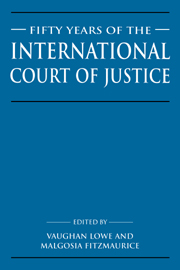Book contents
- Frontmatter
- Contents
- List of contributors
- Preface
- List of abbreviations
- Sir Robert Yewdall Jennings, by Vaughan Lowe
- List of publications of Sir Robert Jennings
- Table of cases
- Part I The International Court of Justice
- Part II The sources and evidences of international law
- 4 The International Court of Justice and the sources of international law
- 5 Municipal law reasoning in international law
- 6 Estoppel and acquiescence
- 7 L'Equité dans la jurisprudence de la Cour Internationale de Justice
- 8 The International Court of Justice and the law of treaties
- 9 International ‘soft law’: a contemporary assessment
- Part III Substance of international law
- Part IV Procedural aspects of the work of the International Court of Justice
- Part V The International Court of Justice and the United Nations
- Index
8 - The International Court of Justice and the law of treaties
Published online by Cambridge University Press: 02 November 2009
- Frontmatter
- Contents
- List of contributors
- Preface
- List of abbreviations
- Sir Robert Yewdall Jennings, by Vaughan Lowe
- List of publications of Sir Robert Jennings
- Table of cases
- Part I The International Court of Justice
- Part II The sources and evidences of international law
- 4 The International Court of Justice and the sources of international law
- 5 Municipal law reasoning in international law
- 6 Estoppel and acquiescence
- 7 L'Equité dans la jurisprudence de la Cour Internationale de Justice
- 8 The International Court of Justice and the law of treaties
- 9 International ‘soft law’: a contemporary assessment
- Part III Substance of international law
- Part IV Procedural aspects of the work of the International Court of Justice
- Part V The International Court of Justice and the United Nations
- Index
Summary
The International Court of Justice has made numerous pronouncements on questions related to the law of treaties, and it is not possible to give an account of them within the confines of this chapter. Therefore it seems necessary to look at some of the more important dicta on rules and principles of the law of treaties from the perspective of a particular point of view. The point of view chosen here can succinctly be called: formality and flexibility (‘and’, not ‘versus'). The question to be asked is what weight the Court in its dealing with matters of the law of treaties has attached to requirements of a formal nature, and in what cases it has given full legal effect to acts and did so irrespective of possibly applicable formal requirements. Clearly, the growing diversity among the participants in the international community that make treaties may call for a measure of suppleness; on the other hand, that same development may no less lead to an urgent and fully justified demand that the security of the law be safeguarded.
As said, not all dicta by the Court in the field of treaties can be reviewed, so a selection of what would seem to be the more significant ones had to be made. In the contributions made by the Court to the law of treaties the Advisory Opinion on Reservations to the Genocide Convention of 28 May 1951 still stands out. That Opinion will therefore presently serve as the point of departure.
- Type
- Chapter
- Information
- Fifty Years of the International Court of JusticeEssays in Honour of Sir Robert Jennings, pp. 145 - 166Publisher: Cambridge University PressPrint publication year: 1996
- 1
- Cited by



